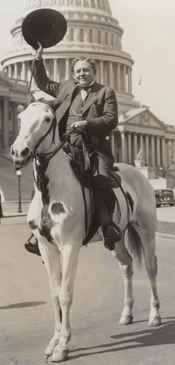
The Encyclopedia of Oklahoma History and Culture
GASSAWAY, PERCY LEE (1885–1937).
Born in Waco, Texas, on August 30, 1885, U.S. Rep. Percy Lee Gassaway was the son of Rev. B. F. and Elizabeth Scoggins Gassaway. A circuit rider for the Southern Methodist Church, Reverend Gassaway moved his family in the 1890s to Fort Sill, where he served as a missionary to the Kiowa and Comanche Indians. A few years later the Gassaway family returned to Texas and purchased the Sinclair Ranch in Lipscomb County. A young Percy married Laura Weaver, and they had a daughter. Following a divorce, Gassaway traveled in the West and lived for a time in Mexico. Upon returning to the United States, he married Linnie Weeks, and the couple had two sons and a daughter. The marriage ended in divorce.
In approximately 1915 Gassaway moved to Coalgate, Oklahoma, where he worked in a pool hall. George Trice, an eminent Oklahoma lawyer, took an interest in the young man and encouraged him to study law. Although he estimated that he had only spent fifteen months in school, Gassaway completed the law course and was admitted to the bar in 1918. During this time he married Loreta Rogers, but she soon died. In 1920 Gassaway married Lillian Fooshee. The couple had two daughters and a son and lived on a ranch near Coalgate.
In the 1920s Gassaway's legal career blossomed. Appointed county judge of Coal County in 1923, he was elected county attorney that same year. In 1926 and 1930 he was elected district judge. A well-known speaker, he stumped the area and state for many Democratic candidates. He also joined numerous organizations, including the Masonic Order, Odd Fellows, Elks, and Farmers' Union.
Although he unsuccessfully ran for Congress in 1928, he was victorious in 1934. Dubbed the "Cowboy Congressman" for his typical attire of high-heeled boots and black, ten-gallon sombrero, he was a popular media figure. When he was elected, he rode a horse to the Capitol's steps. A New Deal Democrat, Gassaway sat on the Judiciary Committee. An advocate of the soldiers' bonus and old age pension laws, he sponsored a bill in 1936 that called for birth control education. Although he fathered fourteen children, seven of whom survived, the congressman was, surprisingly, a staunch supporter of birth control pioneer Margaret Sanger.
During his time in Congress Gassaway repeatedly assailed Sen. Huey P. Long, Jr., and Father Charles E. Coughlin for their opposition to Franklin D. Roosevelt. In a sarcastic attack on Long the Oklahoman argued that the senator's "share the wealth" program should be increased so the average person could keep servants and go to Europe. To Father Coughlin, Gassaway observed that whenever "crackpot preachers" combined politics and religion, trouble usually followed. After his defeat for renomination in 1936, Gassaway returned to his ranch. On May 15, 1937, he died of a heart attack. He was interred in Coalgate Cemetery.






